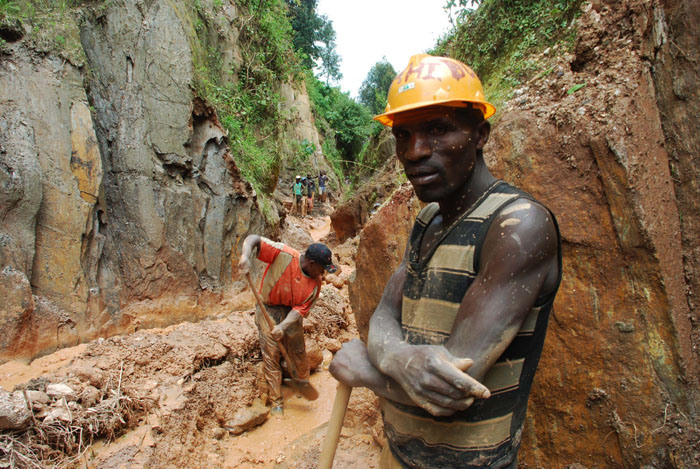
The United Nations Group of Experts on Congo issued their latest report this week, highlighting that the Dodd-Frank legislation on conflict minerals is spurring reform in eastern Congo. The U.N. experts group is normally one of the best sources of information on eastern Congo, as they dig into the roots of the conflict and are not afraid to name officials who are helping perpetuate the war. This interim report, which will be followed up by a full investigative report in November, brought out several key issues regarding both eastern Congo and the LRA conflict:
The Dodd-Frank bill is having an impact. U.N. report: "Since its development in 2010, this United States legislation has proved an important catalyst for traceability and certification initiatives and due diligence implementation in the minerals sector regionally and internationally."
The Congolese army is being investigated for smuggling minerals. U.N. report: "The Group is verifying reports that certain FARDC elements used the suspension as a pretext to confiscate minerals, to levy illegal taxes on operators entering mining sites, or simply to take over mining sites. The Group will also seek to corroborate allegations of the use of military vehicles and military intervention at borders to facilitate the illegal export of natural resources during the suspension. The Group is concerned that such practices established during the suspension are likely to continue today, owing to the high incentive to avoid export duties."
The Congolese army is starting to pull out of mines. They are being replaced with mining police in some areas, which would be a small step in the direction. But if this is to be a real improvement, accountability systems for crimes and oversight from the U.N. peacekeeping force are needed for these police. U.N. report: "FARDC representatives promised the immediate withdrawal of troops from selected sites once the Mining Police are ready for deployment. According to a deployment plan submitted by the provincial police to the provincial Governor on 25 March 2011, 140 members of the Mining Police are to be deployed at six sites in Walikale territory supplying the centre de négoce of Isanga. MONUSCO has trained these mining police forces and is ready to assist their deployment, which had not begun by mid-May, however.”
MONUSCO can help on conflict minerals. This is significant, as MONUSCO, the world's largest peacekeeping operation, could help provide security close to mines. Enough has lobbied the U.N. for this in recent weeks. U.N. report: "MONUSCO is also supposed to monitor the zones and the supply routes around the centres in order to contribute to the stability of the environment, although further definition of this role is urgently needed. Accompanying national officials in regular spot checks and monitoring visits remains an option that the Group would strongly encourage."
LRA attacks are increasing. This is an alarming trend. U.N. report: "The LRA has mounted increasingly brazen attacks by larger groups of fighters against FARDC outposts with the aim of seizing weapons and ammunition. There were at least eight attacks on FARDC targets between January and mid-April 2011, three of them in the month of March alone.”
Contradictory evidence on the FDLR: Reorganizing but negotiating ceasefires. U.N. report: "Operations against the armed group have slowed down, allowing its cadres to train mid-level commanders and new recruits in Walikale territory, North Kivu. … FDLR have sought to reinforce their presence in Rutshuru territory, and there are indications that their strongest battalion,… may be redeployed there soon. … according to government officials of the Democratic Republic of the Congo and FARDC officers, FDLR have recently sought to negotiate a ceasefire in exchange for disarmament and relocation, possibly to Maniema Province."
FDLR is attacking old allies in order to get weapons. The FDLR may be losing money from the minerals trade and are possibly working on alternative strategies. U.N. report: "On multiple occasions in recent months, FDLR have attacked former allies, including Mai Mai Akilo and Mai Mai Sheka apparently in order to retrieve weapons they provided to those groups or to undermine negotiations with FARDC."
Mai Mai "civil defense" militias are still at minerals sites. U.N. report: "Mai Mai Sheka units continue to be present in areas north of the Osso River in Walikale territory and are actively involved in the gold and diamond trades, re-establishing links with FDLR that had apparently been suspended to facilitate negotiations."
Photo: Miner in North Kivu (Enough/Laura Heaton)

